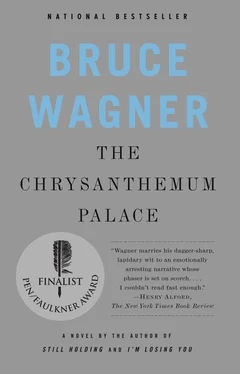He grew pensive, adopting that patented pose of brooding, poetic self-reflection honed over the seasons (just now as I write, the haunting “e le morte stagioni” comes back to me), usually reserved as a summing-up of lessons learned during whichever episode’s excellent adventure.
“What was it like? A world of contrasts and extremes… of great savagery and unexpected kindness… of Machiavellian intrigue and humble, deeply human gestures. You ask me what it was like, Shazuki? Majestic and impoverished, ennobling and depressing — in short, a little bit of heaven and a little bit of hell. Under the Great Dome resides a place where man is forced to face himself, and learn unpleasant— vital —truths. A universal experience, so it seems.”
“Thank you, Captain,” she said, in simple gratitude.
Laughton began dictating his log.
“Star Date 41-17-7. We are now back on course, heading toward Darian 9 after an unprecedented diversion to the Vorbalidian System. Unwitting players in a political power struggle, myself and my crew were held prisoner, ultimately becoming spectators at a gladiatorial battle between Prince Morloch and his twin: our own Ensign Rattweil. The despotic pretender suffered death at his brother’s hands — this, the happiest of outcomes. As we returned to the city, its streets lined with the joyous populace, it became clear that—”
“Receiving images, Captain!” interjected Shazuki.
X-Ray made a timely reappearance to the bridge as the crew gathered before the staticky starscreen. After a few moments, Thad appeared, flanked by Clea and the revivified Queen Mother. He wore a bejeweled crown, clutching a tall scepter. The three waved at their subjects. Thad turned to look directly at the Demeter, mouthing something which couldn’t be understood.
“What’s he saying?” said the frustrated captain.
The lieutenant commander furiously worked her controls. “I don’t have audio…”
Laughton relaxed, drinking in the starscreen triumvirate.
“It isn’t important,” he said.
“The king isn’t there…” noted X-Ray curiously.
“The king is dead,” said the captain, with resolute benevolence. “Long live the king! Having defeated Morloch, our humble ensign has assumed the throne.”
“Without a doubt,” said the droid. “The emblem on his tunic denotes rulership of their world.”
“Which emblem?” said the captain, straining to look.
“Above his heart, sir,” I offered. “The ‘chrysanthemum,’ if you will.”
Shazuki did her best to read the royal lips.
“He’s thanking us, sir — both in English and his native tongue.”
“Looks like Rattweil and the ambassador finally hooked up,” I karped, back to horny, flyboy form. “Soon she’ll be queen.”
“Send a message,” said the captain, all business. “From the crew of the USS Starship Demeter. Tell him that… as his shipmates, we were most honored to have served with him. That we shall always think of him, and forever hold him in our hearts. Wish the monarch and his people well. And tell him…”
He paused, searching for the proper words. His eyes grew moist.
“Tell him he is every inch a king.”
Lights on the bridge lowered as camera dollied toward starscreen. The frame tightened until only an ebullient Thad and Clea could be seen, arm in arm, as at the moment rice is thrown at a wedding. I threw grains with all my might, across light-years of time and constellatory space.
AS I WAS SAYING ATthe beginning of these pages: I was at the bakery awaiting a latte when a young father came in, holding a babe in arms. But let me paraphrase, and even add some detail, so the reader needn’t thumb backward.
It was on a Thursday afternoon when I found myself at the Sugar Plum confectionary (now defunct), hand poised on legal pad, dog-eared copy of Jack Michelet’s Chrysanthemum spread — forgive the word — before me. Something wasn’t sitting well. I had consented to adapt the book for a welter of reasons which I hope I’ve made clear. But I didn’t like the novel; in fact, I’d grown to hate it. Worse, I didn’t feel wonderful for having taken the job in the first place.
I was on a third latte, this one by necessity decaffeinated. I’d mentioned earlier, one may recall, how experience had shown that I was somewhat of a “magnet for babies’ eyes”—the bundle now before me proving no exception. He fussed and squirmed in Daddy’s arms while fixing me with the expected stare, just long enough to get my attention.
His view then shifted somewhere beyond. I glanced, as did his father, to see where he was focusing, but the end point was amorphous.
That was when the infant, gaze unwavering, giggled with ineffable ecstasies — he was communing with the infinite, and like a bodhisattva, tried showing us the way.
“What do you see?” said his father. “What do you see?”
I looked and suddenly did see: the design of baby-faced Thad, and Clea too — and of the twins the coroner said were in her belly waiting to be born — saw Castor and Pollux, Leif Farragon and little boy Me. I looked and looked until the gooey sumptuous Badwater stillness lifted up behind them, behind all machinations, no matter how luxurious, threadbare, desperate, or giving, saw the selfless scrim that rose and ceaselessly fell upon this earthly stage of triumph and trespass, saw it there, in the eyes of this melodious sweetshop angel, cooing and gurgling like a desert fount, the fancifully ridiculous, idiotic heartbreak of the whole damn thing — and knew I could never face myself without at least trying to set it down as best I could.
So that’s what I’ve done.
And I couldn’t be more grateful you’ve stayed to the end. Maybe— maybe —I should have followed the advice of Jack Michelet when he said in that vile interview how certain pages should be burned. But I’m throwing my pages, and caution, to the wind.
Because as Mother loves to say, life’s too short.
Don’t you think?
About the Author
BRUCE WAGNER is the author of Force Majeure; I’m Losing You; I’ll Let You Go, which was nominated for a PEN USA fiction award; and Still Holding . Two movies ( I’m Losing You and Women in Film ) adapted from his books have been shown at the Telluride, Toronto, Venice, and Sundance film festivals.












